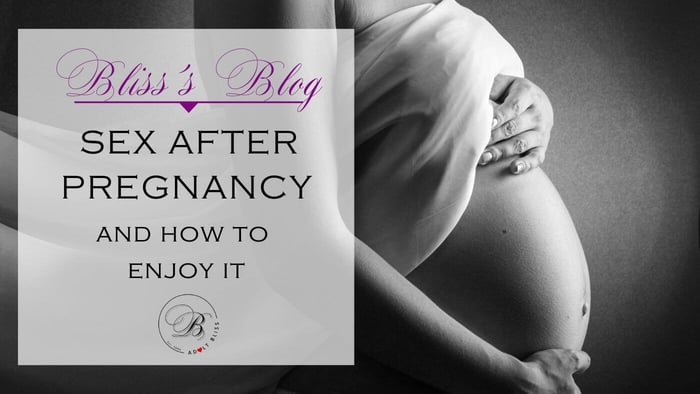
Sex After Pregnancy: What to Expect, When to Start, and How to Navigate the Changes
Jump To Section
Sex After Pregnancy: What to Expect
Being pregnant results in more than just a super cute addition to your family. There are multiple changes that take place, not only with the pregnant individual but also within the relationships with those around them. Unsurprisingly, people are concerned about their intimate and sexual relationships after pregnancy and how these will change with the new arrival. In this blog post, I will talk about the changes that take place during and after pregnancy, when you can have sex again and what to do if things are not going as you had hoped.
Jo H2O Original Lubricant

$17.95
JO H2O Original, our most versatile (and best-selling!) formula, truly sets the standard for water-based lubricants. Its sensual, comforting glide and silky-smooth feel are perfect...… read more
Get One NowChanges That Occur During and After Pregnancy
It is not hard to notice the physical changes that place in a person’s body while they are pregnant. There are significant permanent changes that take place to accommodate the growth and birth of a baby and it can be very confronting for people who do not expect this. Some people are impacted by these changes in such a way that they don’t want to have sex or be intimate with someone that they were once comfortable with. The fear of being judged as not being as physically desirable as before they were pregnant is very real for a lot of people, and pressure to return to a pre-baby body is everywhere.

Physical and Hormonal Shifts
Everybody is different and there are a variety of physical, psychological and emotional changes that take place for pregnant people. Libido is often affected and while some people may experience a surge in their sex drive whilst pregnant, this can then completely disappear after the birth of their baby. This is due in part to estrogen levels going back to pre-pregnancy levels rapidly after birth, and if a mother is breastfeeding, their estrogen levels can drop even further. Estrogen is key for many body functions, including vaginal lubrication, so the changes that take place regarding hormones cannot be underestimated.
Recovery After Birth
People’s physical recovery from pregnancy and birth can vary, depending on the type of birth and any additional trauma the body sustained. Caesarean births are considered a major abdominal surgery so require special care afterwards, but a natural vaginal birth can also result significant damage to the vagina and surrounding areas. Sexual activities which may have been pleasurable before may be uncomfortable and difficult post pregnancy and birth, and this may be temporary as the body repairs itself or it may be longer lasting.
When Can You Have Sex Again?
The main question that people have regarding sex and birth is when they can have sex again.
The 6-Week Recommendation (and Why It's Not a Rule)
Although some health professional will recommend a standard 6 weeks before having penetrative sex, it all just really depends on how you and your partner feel. You don’t need to avoid sex, (unless this has been explicitly said by your health professional based on your birth experience) but also you should not feel pressured to have sex.
Exploring Other Types of Intimacy
Having a baby is bound to change the kind of sex you have and have often you have it. Not only does the care of a baby impact on time and energy levels, but lots of people report feeling “touched out” from the intense physical contact that newborns require. Maintaining communication with your partner about these feelings is really important, as well as making sure you are sharing the burden of household tasks, and spending quality time together. This is a really good time explore and develop other types of intimacy aside from penetrative sex. Cuddling, holding hands, kissing and massage are ways to build confidence in physical affection and explore what feels good.

Don’t Forget Contraception
It is also important to remember contraception if you are a heterosexual couple. Some birthing mothers are fertile and able to conceive even before they have a period, so make sure you discuss contraception with your partner before unprotected, penetrative sex. Some say that it is less likely for you become pregnant if you are breastfeeding, but there are no guarantees. If you are not ready to become pregnant immediately, then act accordingly and get protected!
If Things Aren’t Going As Planned
When it comes to having babies, you will find that the best laid plans rarely go as expected. This is why communication is key and seeking help when you need it is so important. Physical recovery, change in lifestyle and expectations not being reflected in reality can make this a difficult period for couples.
Physical vs. Emotional Factors
Pinpointing the source of the issue can also be challenging. For example, discomfort experienced during sex can be due to the body not being healed sufficiently, but it can also be due to anxiety stemming from multiple points described earlier.
When to Ask for Help
If you are having issues with returning to the sex life you want, the best thing to do is to talk to your health care professional about what is going on. It is a very common point of discussion after birth, and healthcare professionals have multiple resources they can access to assist you. Although you may not think it is important in the eyes of GPs, there is continued emphasis of sexual health and relationships in the post-natal period as part of best practice. So they are best placed to have your initial discussions.
Closing statement
Negotiating sexual relationships and intimacy after birth can be a challenging and uncomfortable process, but being aware of all the things that impact will have you better placed to deal with whatever you face.
FAQs
When is it safe to have sex after giving birth?
Many doctors suggest waiting at least 6 weeks, but timing really depends on your physical and emotional recovery. Always check with your healthcare provider, especially if you experienced tearing, surgery, or complications during birth.
Will sex feel different after pregnancy?
It might. Hormonal changes, reduced estrogen, and physical healing can impact sensitivity, lubrication, and comfort. These changes can be temporary or longer-term, but many people adjust with time, communication, and support.
What if I don’t feel like having sex after giving birth?
Totally normal. Between hormone shifts, body image concerns, fatigue, and being "touched out" from caring for a newborn, desire can take a backseat. Focus on rest, communication, and gentle forms of connection while you recover.
Can I get pregnant again before my first period?
Yes. Ovulation can occur before your first postpartum period. Even if you're breastfeeding, which can reduce fertility, it’s not a guarantee. Talk to your GP about contraception if you’re not ready for another pregnancy.
What should I do if sex is painful after pregnancy?
Pain may be a sign your body hasn't fully healed or may be related to hormonal changes, dryness, or even emotional stress. Try using lubricant and talk to a health professional for support and tailored advice.
Is it normal for my relationship to feel different after a baby?
Absolutely. Shifting roles, new responsibilities, sleep deprivation, and emotional changes affect nearly every couple. Honest conversations, shared duties, and seeking support can go a long way in strengthening your relationship.









